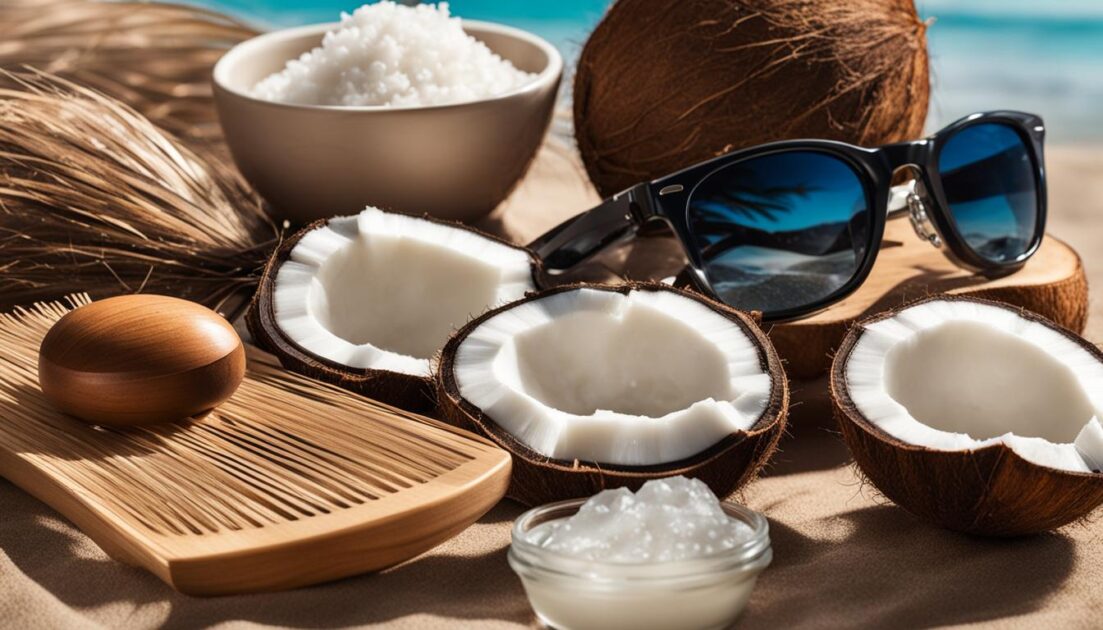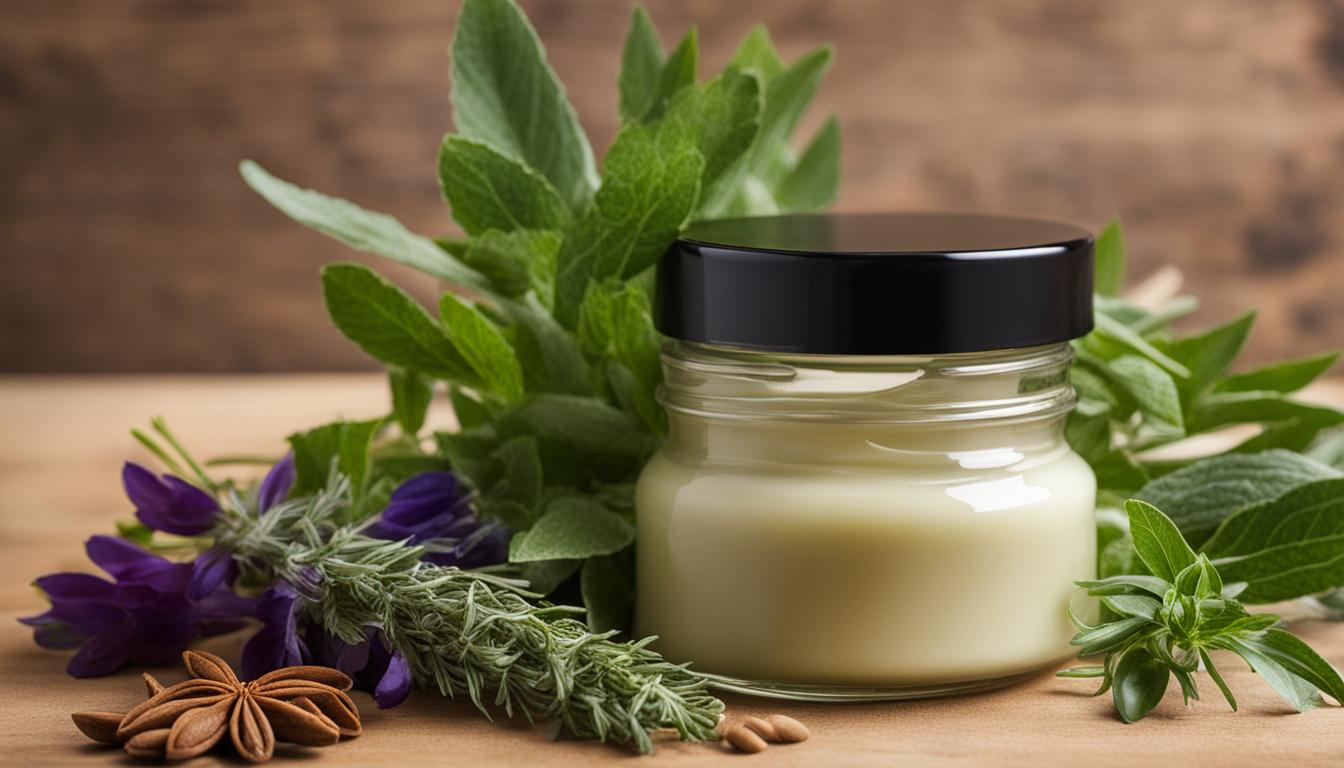Coconut oil is a versatile ingredient that offers a wide range of uses and benefits. From cooking and baking to skincare and hair care, coconut oil has gained popularity for its natural properties and potential health advantages.
In this comprehensive guide, I will explore the various ways coconut oil can enhance your life and provide tips for selecting the best quality oil and proper storage. So whether you’re looking to add flavor to your culinary creations or improve the health of your skin and hair, coconut oil has you covered.
Key Takeaways:
- Coconut oil is a versatile ingredient with numerous uses and benefits.
- It can be used for cooking, baking, skincare, and hair care.
- When using coconut oil, choose high-quality options and store them properly.
- Coconut oil offers natural properties and potential health advantages.
- Exploring the different uses and benefits of coconut oil can enhance your life in various ways.
Understanding Coconut Oil: A Primer on Its Types and Properties

In this section, we will provide an introduction to coconut oil by discussing the different types available – virgin and refined coconut oil. Understanding the distinctions between these types will help you choose the most suitable coconut oil for your specific needs and preferences.
Virgin vs Refined: Choosing the Right Coconut Oil
Virgin coconut oil is extracted from fresh coconut meat without undergoing any refining processes. It retains its natural aroma and flavor, making it ideal for recipes where a strong coconut taste is desired. Virgin coconut oil is often preferred for its potential health benefits, as it contains a higher amount of phytonutrients and antioxidants compared to refined coconut oil.
On the other hand, refined coconut oil is extracted from dried coconut meat, which undergoes processes such as bleaching, deodorizing, and high-temperature refining. These processes remove the distinctive aroma and flavor of the coconut, resulting in a neutral-tasting oil. Refined coconut oil has a higher smoke point, making it suitable for high-heat cooking methods.
When choosing between virgin and refined coconut oil, consider the intended use and personal preferences. If you enjoy the natural taste and aroma of coconut, virgin coconut oil is a great choice. If you prefer a neutral flavor or need an oil with a higher smoke point for cooking at high temperatures, refined coconut oil may be more suitable.
Savoring the Saturated: The Fatty Acid Composition
Coconut oil is predominantly composed of saturated fats, with approximately 90% saturated fatty acids. The most abundant fatty acid in coconut oil is lauric acid, which is known for its antimicrobial properties and potential health benefits. Lauric acid makes up about 40% of the total fatty acid composition of coconut oil. Other saturated fatty acids found in coconut oil include caprylic acid, capric acid, and myristic acid.
The high saturated fat content of coconut oil has been a topic of debate in the past. However, emerging research suggests that not all saturated fats are created equal, and their impact on health may be more nuanced than previously believed.
Constituents Behind Its Health Impacts: MCTs and Plant Sterols
In addition to its fatty acid composition, coconut oil contains other constituents that contribute to its potential health impacts. One notable group of compounds found in coconut oil is medium-chain triglycerides (MCTs). MCTs are shorter in length compared to long-chain triglycerides found in most dietary fats. Due to their structure, MCTs are quickly absorbed and metabolized by the body, providing a readily available source of energy.
Alongside MCTs, coconut oil also contains plant sterols, which are naturally occurring compounds found in plants. Plant sterols have been associated with potential cholesterol-lowering effects and may have a beneficial impact on heart health.
These constituents, including MCTs and plant sterols, contribute to the potential health impacts associated with coconut oil consumption. The fatty acid composition, MCTs, and plant sterols combined make coconut oil a unique ingredient with various properties and potential benefits.
The Multifaceted Health Implications of Coconut Oil

In this section, I will delve into the numerous health implications of coconut oil. I will address common myths surrounding coconut oil’s impact on heart health and provide evidence-based information to help readers make informed decisions. Additionally, I will examine the potential benefits of coconut oil for weight management, focusing on the role of MCTs. Lastly, I will delve into the potential brain health benefits of coconut oil, specifically in relation to Alzheimer’s disease.
Debunking Myths: Is Coconut Oil Heart Healthy?
There has been some debate about the impact of coconut oil on heart health. Contrary to popular belief, coconut oil is not a heart-healthy oil. It is high in saturated fat, which, when consumed in excess, can raise LDL (bad) cholesterol levels. Studies have shown that replacing saturated fats with unsaturated fats, such as olive oil or avocado oil, can lower the risk of heart disease. While coconut oil can be included in moderation as part of a balanced diet, it should not be relied upon as a sole source of healthy fats.
Caloric Considerations: Weight Management with MCTs
Coconut oil contains a unique type of fat called medium-chain triglycerides (MCTs). Unlike long-chain triglycerides found in other oils, MCTs are metabolized differently in the body. They are quickly absorbed and converted into energy, making them less likely to be stored as body fat. Some studies suggest that consuming MCTs can increase calorie burning and promote weight loss. However, it’s important to note that coconut oil is still high in calories, so portion control is key when incorporating it into a weight management plan.
MCTs and Brain Function: Potential Alzheimer’s Benefits
One area of ongoing research is the potential benefits of coconut oil, specifically the MCTs it contains, for brain health. MCTs are converted into ketones, which can serve as an alternative energy source for the brain. This has led to speculation that coconut oil could have a positive impact on individuals with Alzheimer’s disease, who often have difficulty utilizing glucose, the brain’s primary fuel source. While some small studies have shown promising results, more research is needed to fully understand the potential benefits of coconut oil for brain health and Alzheimer’s disease.
Overall, while coconut oil has become popular for its potential health benefits, it’s important to approach its consumption with moderation and consider the context of an individual’s overall diet and health. The health implications of coconut oil extend beyond heart health, with potential impacts on weight management and brain health. As with any dietary choice, it’s always best to consult with a healthcare professional for personalized guidance and recommendations.
Coconut Oil Uses in the Kitchen: Beyond Frying and Baking

In addition to its traditional uses in frying and baking, coconut oil has a wide range of applications in the kitchen. Its unique properties make it a superior cooking companion, offering both flavor and health benefits. Let’s explore some of the ways you can incorporate coconut oil into your culinary creations.
Why Coconut Oil is a Superior Cooking Companion
Coconut oil stands out among other cooking oils for several reasons. Firstly, it has a pleasant, tropical flavor that adds depth to dishes. Whether you’re sautéing vegetables or pan-searing chicken, coconut oil imparts a delicious taste that elevates your meals.
Furthermore, coconut oil has a high smoke point, which means it can withstand high temperatures without breaking down and producing harmful compounds. This makes it perfect for stir-frying, grilling, and even deep-frying.
Additionally, coconut oil is rich in medium-chain triglycerides (MCTs). Unlike long-chain fatty acids found in other oils, MCTs are easily digestible and quickly converted into energy. Incorporating MCT-rich coconut oil into your cooking can provide a quick and sustained source of fuel for your body.
Sweet Compromise: Coconut Oil in Sugar-Free Baking
If you’re looking to reduce your sugar intake without compromising on flavor, coconut oil is your go-to ingredient for sugar-free baking. Its natural sweetness and creamy texture make it an excellent substitute for butter or margarine.
Coconut oil adds moisture and tenderness to baked goods, resulting in treats that are both healthier and delectable. From cookies and cakes to muffins and bread, you can rely on coconut oil to create a wide range of sugar-free delights.
Try using coconut oil in your favorite recipes or experiment with new ones. You’ll be amazed at how it enhances the taste and texture of your baked goods while providing the added benefits of a healthier alternative.
Check out the recipe below for a sugar-free coconut oil banana bread that will satisfy your sweet cravings:
| Ingredients | Instructions |
|---|---|
| – 2 ripe bananas, mashed | 1. Preheat the oven to 350°F (175°C). Grease a loaf pan with coconut oil. |
| – 1/4 cup coconut oil, melted | 2. In a large bowl, combine the mashed bananas and melted coconut oil. |
| – 1/4 cup honey or maple syrup | 3. Stir in the honey or maple syrup. |
| – 2 eggs | 4. Add the eggs, one at a time, mixing well after each addition. |
| – 1 tsp vanilla extract | 5. Stir in the vanilla extract. |
| – 1 3/4 cups whole wheat flour | 6. Gradually add the whole wheat flour, mixing until just combined. |
| – 1 tsp baking soda | 7. Gently fold in the baking soda. |
| – 1/2 tsp salt | 8. Add the salt and mix until everything is well incorporated. |
| – 1/2 cup chopped walnuts (optional) | 9. Fold in the chopped walnuts, if desired. |
| 10. Pour the batter into the greased loaf pan and smooth the top. | |
| 11. Bake for 50-60 minutes, or until a toothpick inserted into the center comes out clean. | |
| 12. Allow the banana bread to cool in the pan for 10 minutes, then transfer it to a wire rack to cool completely before slicing and serving. |
Enjoy the delicious aroma of coconut oil while indulging in guilt-free sugar-free baking. With coconut oil as your secret ingredient, you can create healthy and tantalizing treats that will satisfy both your taste buds and your well-being.
Stretching Beyond Culinary Boundaries: Alternative Uses of Coconut Oil
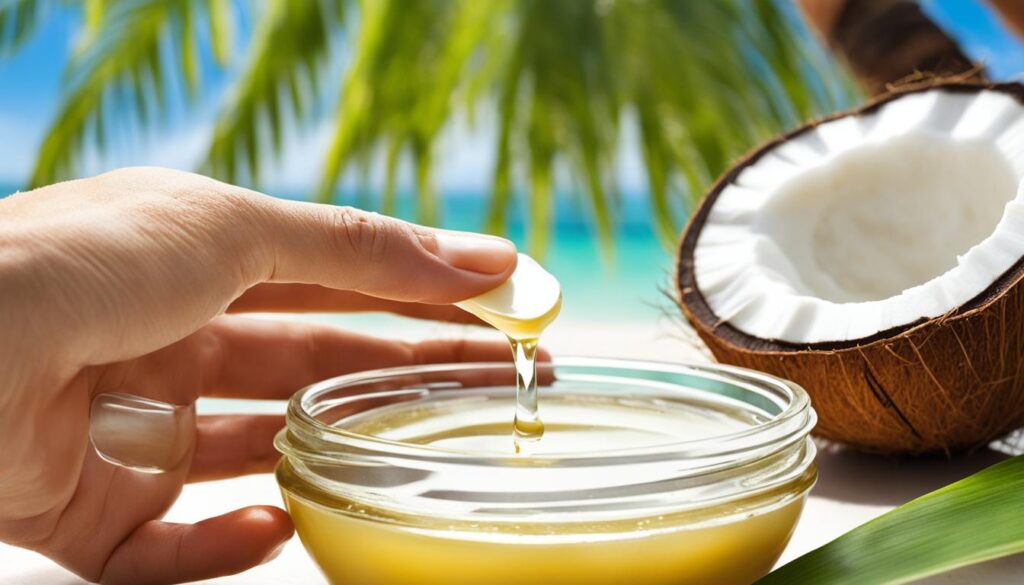
In addition to its culinary applications, coconut oil offers a multitude of alternative uses that can enhance your beauty and wellness routine. From nourishing the skin to promoting hair health, this versatile oil is a natural solution for various concerns. Let’s explore how coconut oil can be your go-to natural moisturizer and hair nourishment.
Finding Serenity in Skin Care: Coconut Oil as a Natural Moisturizer
Coconut oil is an excellent natural moisturizer packed with skin-loving properties. Its rich consistency helps to deeply hydrate and nourish the skin, leaving it soft, supple, and radiant. Unlike many commercial moisturizers that contain potentially harmful chemicals, coconut oil is a safer and more natural option.
Coconut oil contains fatty acids that help to strengthen the skin’s protective barrier, preventing moisture loss and promoting long-lasting hydration. Its antimicrobial properties can also help combat skin issues such as dryness, eczema, and psoriasis.
To incorporate coconut oil into your skincare routine, simply warm a small amount in your palms and gently massage it onto clean, dry skin. Allow the oil to absorb for a few minutes before applying other products or makeup. For a nourishing overnight treatment, apply a slightly thicker layer of coconut oil and let it work its magic while you sleep.
Lustrous Locks: Coconut Oil for Hair Nourishment
Coconut oil is not just beneficial for the skin; it can also work wonders for your hair. Whether your mane is dry, damaged, frizzy, or lacking shine, coconut oil can help rejuvenate and nourish your locks.
The unique structure of coconut oil allows it to penetrate the hair shaft, providing deep hydration and nourishment. It helps to strengthen the hair from within, reducing breakage and split ends. Coconut oil also forms a protective barrier on the hair strands, shielding them from environmental damage, such as UV rays and heat styling.
To use coconut oil for hair nourishment, warm a small amount of oil between your palms and apply it to damp hair, focusing on the ends and any areas that require extra attention. Leave the oil on for at least 30 minutes, or for a more intensive treatment, wrap your hair in a warm towel and leave the oil on overnight. Afterward, shampoo and condition as usual to reveal lustrous, healthy-looking hair.
With coconut oil, you can harness its natural moisturizing properties to pamper your skin and promote optimal hair health. Give it a try and experience the transformative power of this versatile oil.
Unlocking the Potential of MCTs: Coconut Oil for Weight Loss
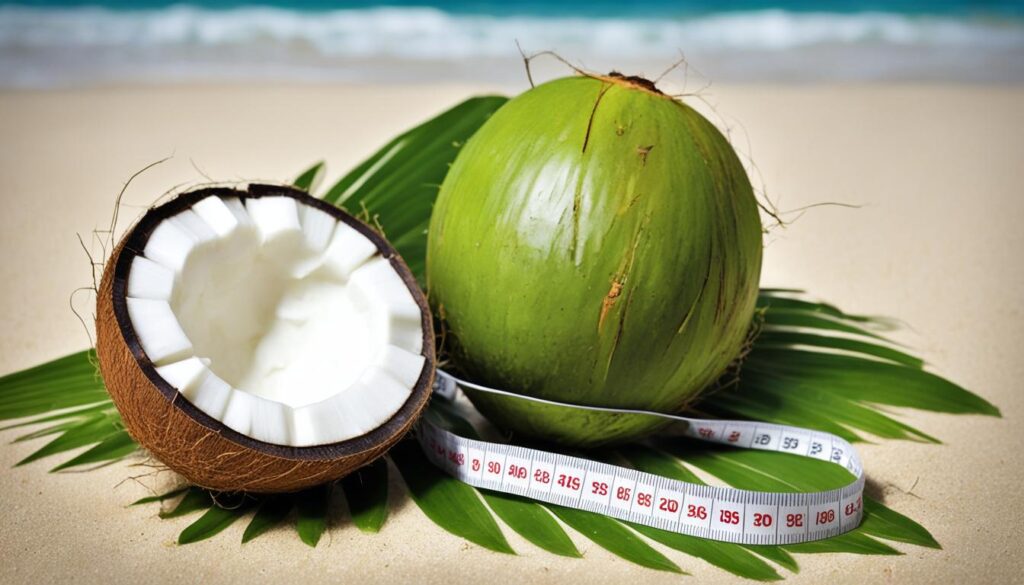
In this section, we will focus on the potential of MCTs found in coconut oil for weight loss. MCTs, or medium-chain triglycerides, are a type of healthy fat that can increase calorie burning and potentially aid in weight management.
Consuming MCTs can boost your metabolism and increase the number of calories you burn throughout the day. This can be especially beneficial for individuals looking to lose weight or maintain a healthy weight.
Coconut oil is a rich source of MCTs and can easily be incorporated into your diet. You can use it as a substitute for other oils and fats in cooking and baking, or add a spoonful to your morning coffee or smoothie.
To take advantage of the weight loss benefits of coconut oil, it’s important to remember that it should be consumed in moderation as part of a balanced diet. Incorporating other healthy fats and nutrients, along with regular exercise, is key to achieving sustainable weight loss.
Coconut Oil Uses for Skin: A Regimen for Radiance
When it comes to achieving healthy and radiant skin, coconut oil can be a game-changer. Its moisturizing properties make it an excellent natural moisturizer that can improve skin hydration and overall radiance. Coconut oil is packed with essential fatty acids that help nourish and hydrate the skin, leaving it soft, supple, and glowing.
Using coconut oil as part of your daily skincare routine can provide numerous benefits. Whether you have dry, sensitive, or aging skin, incorporating coconut oil into your regimen can help enhance your skin’s appearance and promote a youthful glow.
Moisturizing Marvel: The Hydrating Power of Coconut Oil
Coconut oil’s ability to deeply moisturize the skin is what sets it apart from other conventional moisturizers. The fatty acids present in coconut oil, such as lauric acid and caprylic acid, create a protective barrier on the skin, preventing moisture loss and locking in hydration.
When applied topically, coconut oil penetrates deep into the skin, nourishing and moisturizing it from within. It helps restore the skin’s natural oil barrier and improves its ability to retain moisture, making it a natural and effective moisturizer for all skin types.
Safe Sunning: Coconut Oil’s Role as a Natural Sunscreen
In addition to its moisturizing properties, coconut oil can also serve as a natural sunscreen. While it does not provide the same level of sun protection as commercial sunscreens, it can offer some degree of protection against harmful UV rays.
Coconut oil contains natural SPF properties that can help shield the skin from UVA and UVB rays. It acts as a physical barrier by reflecting the sun’s rays off the skin’s surface. However, it is important to note that coconut oil alone is not sufficient for prolonged sun exposure or intense sunlight. It should be used in conjunction with other sun protection measures, such as wearing hats, sunglasses, and seeking shade during peak sun hours.
When using coconut oil as a sunscreen, it is recommended to reapply it every two hours and after swimming or sweating, as it can easily wash off.
Skincare Routine: Incorporating Coconut Oil into Your Daily Regimen
Integrating coconut oil into your skincare routine is simple and can offer remarkable benefits for your skin. Here are some tips on how to incorporate coconut oil effectively:
- Cleansing: Use coconut oil as a gentle and natural makeup remover by applying a small amount on a cotton pad and wiping away impurities.
- Moisturizing: Apply coconut oil as the final step in your skincare routine by gently massaging a small amount onto clean, damp skin. Allow it to absorb before applying makeup or going to bed.
- Treating Dry Skin: For areas of the skin that tend to be drier, such as elbows, knees, and heels, apply a thick layer of coconut oil and leave it on overnight to deeply hydrate and soften the skin.
- Exfoliation: Mix coconut oil with a natural exfoliant, such as sugar or coffee grounds, to create a gentle and effective body scrub. Use this scrub once or twice a week to remove dead skin cells and reveal smoother, softer skin.
Remember, everyone’s skin is unique, so it’s important to test coconut oil on a small patch of skin before incorporating it into your regular routine. If any irritation occurs, discontinue use.
Pros and Cons of Using Coconut Oil for Skin
| Pros | Cons |
|---|---|
| Deeply moisturizes and nourishes the skin | May cause breakouts or clog pores for some individuals |
| Has natural antimicrobial properties | May not provide sufficient sun protection on its own |
| Suitable for all skin types | May feel greasy or heavy on the skin for some |
| Packed with essential fatty acids and antioxidants | May not be suitable for individuals with coconut allergies |
Using coconut oil for skin care can be a transformative experience, providing deep hydration, nourishment, and protection. Incorporate it into your skincare routine and enjoy the benefits of this versatile natural moisturizer.
Revitalizing Rituals: Coconut Oil for Hair Care

In this section, I will discuss the various uses of coconut oil for hair care. Coconut oil is a natural and versatile ingredient that can act as a barrier against breakage, nourishing the hair and promoting overall hair health. Additionally, I will provide recipes and tips for using coconut oil in deep conditioning treatments and homemade hair masks to address specific hair concerns.
A Barrier Against Breakage: Deep Conditioning Treatments
Deep conditioning treatments are an essential part of a hair care routine, especially for those dealing with dry or damaged hair. Coconut oil can play a crucial role in these treatments by providing intense moisture and nourishment to the hair.
To create a deep conditioning treatment with coconut oil, simply follow these steps:
- Start with clean, damp hair.
- Take a small amount of coconut oil and warm it between your hands.
- Apply the coconut oil evenly to your hair, focusing on the ends and any dry or damaged areas.
- Gently massage the oil into your scalp for a few minutes to stimulate blood circulation.
- Cover your hair with a shower cap or towel and leave the treatment on for at least 30 minutes or overnight for a more intensive treatment.
- Rinse out the coconut oil thoroughly with warm water and shampoo as usual.
Regular deep conditioning treatments with coconut oil can help improve the overall health and appearance of your hair, making it softer, smoother, and more manageable.
Homemade Hair Masks: The DIY Approach with Coconut Oil
DIY hair masks are a great way to address specific hair concerns and customize your hair care routine. Coconut oil can be a key ingredient in these masks, providing various benefits depending on the additional ingredients you choose to include.
Here are a few simple DIY hair mask recipes featuring coconut oil:
- Coconut Oil and Honey Mask: Mix 2 tablespoons of melted coconut oil with 1 tablespoon of honey. Apply the mixture to your hair and leave it on for 20-30 minutes before rinsing.
- Coconut Oil and Banana Mask: Mash 1 ripe banana and mix it with 2 tablespoons of melted coconut oil. Apply the mask to your hair, focusing on the roots and ends. Leave it on for 30-45 minutes before rinsing.
- Coconut Oil and Yogurt Mask: Mix 2 tablespoons of melted coconut oil with 1/2 cup of plain yogurt. Apply the mask to your hair, ensuring it is evenly distributed. Leave it on for 30 minutes before rinsing.
These homemade hair masks can help nourish and repair your hair, leaving it feeling soft, silky, and rejuvenated.
Please note that it is important to conduct a patch test before using any new products or ingredients on your hair to check for any allergic reactions. Additionally, results may vary, so it is best to experiment and find the hair care routine that works best for you.
Coconut Oil for Health: Examining Its Medical Merits
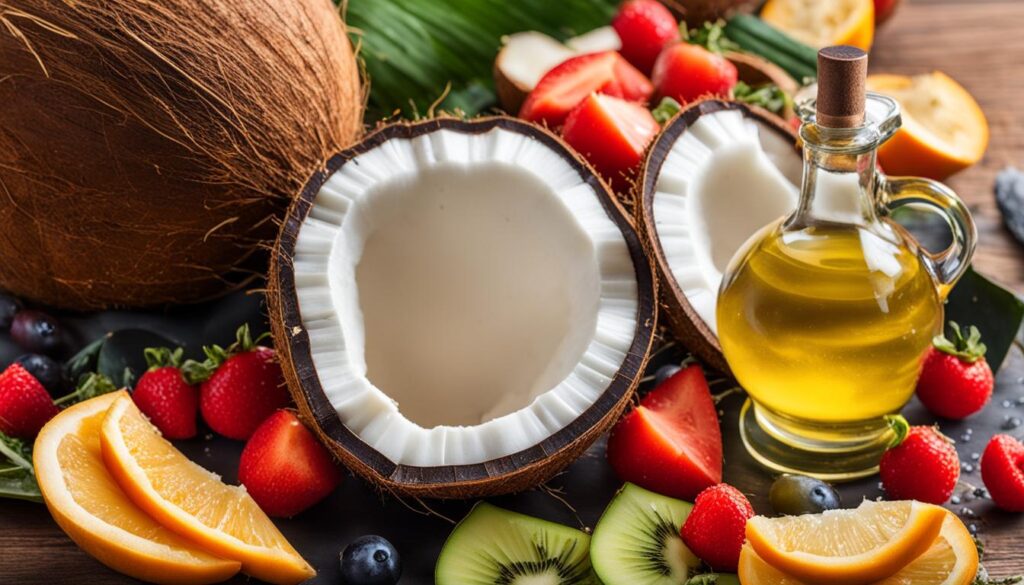
In addition to its culinary and beauty uses, coconut oil has gained attention for its potential health benefits. This section will explore the medical merits of coconut oil, focusing on its role in mitigating Alzheimer’s symptoms and its potential anti-inflammatory actions for conditions like arthritis. Incorporating coconut oil into a holistic approach to health can provide natural remedies for various health concerns.
The Ketone Connection: Can Coconut Oil Mitigate Alzheimer’s Symptoms?
Recent research has suggested a potential link between coconut oil and improved cognitive function in individuals with Alzheimer’s disease. The medium-chain triglycerides (MCTs) found in coconut oil can be metabolized in the liver and converted into ketones, which serve as an alternative energy source for the brain. Ketones may help compensate for the brain’s diminished ability to utilize glucose as a fuel source in Alzheimer’s patients. While further studies are needed to fully understand the impact of coconut oil on Alzheimer’s symptoms, early findings are promising.
Anti-inflammatory Actions: Potential Benefits for Arthritis and More
Coconut oil also exhibits potential anti-inflammatory properties, thanks to its high content of lauric acid and other beneficial compounds. These properties make it a potential natural remedy for conditions characterized by inflammation, such as arthritis. While more research is needed to fully understand the extent of coconut oil’s anti-inflammatory benefits, preliminary studies suggest that its use may help reduce pain and inflammation associated with arthritis. Incorporating coconut oil into a well-rounded, healthy lifestyle may be a natural way to manage inflammation and improve overall well-being.
To experience the potential health benefits of coconut oil, it is essential to choose high-quality, organic virgin coconut oil. Incorporate it into your diet and skincare routine to harness its natural properties and enhance your overall health and wellness.
| Medical Merits of Coconut Oil | Benefits |
|---|---|
| Mitigating Alzheimer’s Symptoms | Potential link between coconut oil and improved cognitive function in Alzheimer’s patients |
| Anti-inflammatory Actions | Potential natural remedy for arthritis and other inflammatory conditions |
A Closer Look at Lauric Acid: The Antimicrobial Powerhouse in Coconut Oil
When exploring the many components of coconut oil, it is impossible to overlook the remarkable antimicrobial properties of one key ingredient: lauric acid. Lauric acid, a saturated fatty acid, is abundant in coconut oil and plays a crucial role in its overall health benefits. This section will dive deep into the scientific research and studies that support the antimicrobial effects of lauric acid, shedding light on its potential to support a healthy immune system.
Studies have shown that lauric acid exhibits potent antimicrobial activity against a wide range of bacteria, fungi, and viruses. Its unique structure allows it to disrupt the protective membranes of these microorganisms, leading to their destruction. This antimicrobial action makes lauric acid a powerful tool in combating various infections, both internally and externally.
The health benefits of lauric acid extend beyond its antimicrobial properties. Research suggests that lauric acid may also have anti-inflammatory and antioxidant effects, potentially contributing to overall wellness. While more studies are needed to fully understand the extent of these benefits, the existing evidence is promising.
Incorporating coconut oil, rich in lauric acid, into your daily routine may provide a natural and effective way to support your immune system and promote overall health. Whether used in cooking, skincare, or hair care, coconut oil can harness the antimicrobial power of lauric acid to enhance your well-being.
FAQ
What are the uses of coconut oil?
Coconut oil has numerous uses, including cooking, baking, skin care, hair care, and even for improving overall health.
What are the benefits of using coconut oil?
Coconut oil offers various benefits, such as moisturizing the skin, nourishing the hair, potential weight loss aid, and promoting brain health.
What is the difference between virgin and refined coconut oil?
Virgin coconut oil is made from fresh coconut meat and retains its natural flavor and aroma, while refined coconut oil undergoes further processing and has a milder taste.
What are medium-chain triglycerides (MCTs) in coconut oil?
MCTs are a type of fatty acid found in coconut oil that can be easily absorbed by the body and potentially contribute to weight management and brain health.
Is coconut oil heart-healthy?
There is some controversy regarding coconut oil and heart health. While it does contain saturated fats, studies suggest that its impact on heart health may be more complex.
Can coconut oil help with weight loss?
Coconut oil, especially its MCT content, may support weight loss by increasing calorie burning and promoting satiety. However, it should be consumed in moderation within a balanced diet.
How can coconut oil be used in cooking beyond frying and baking?
Coconut oil is a versatile cooking companion and can be used for sautéing vegetables, adding to smoothies, as a substitute for butter in recipes, and even for making healthier treats like sugar-free baked goods.
Can coconut oil be used as a natural moisturizer for the skin?
Absolutely! Coconut oil is an excellent natural moisturizer that can help hydrate the skin, improve its radiance, and even provide protection against harmful UV rays.
How can coconut oil benefit hair care?
Coconut oil can nourish the hair, reduce frizz, add shine, and act as a protective barrier against breakage. It can be used in deep conditioning treatments and homemade hair masks to promote overall hair health.
Is there any medical merit to using coconut oil?
Some studies suggest that coconut oil, particularly its medium-chain fatty acids, may have potential benefits for conditions like Alzheimer’s disease and as an anti-inflammatory remedy for conditions such as arthritis.
What is lauric acid, and why is it important in coconut oil?
Lauric acid is a fatty acid present in coconut oil known for its antimicrobial properties. It contributes to the overall health benefits and potential immune-boosting properties of coconut oil.
